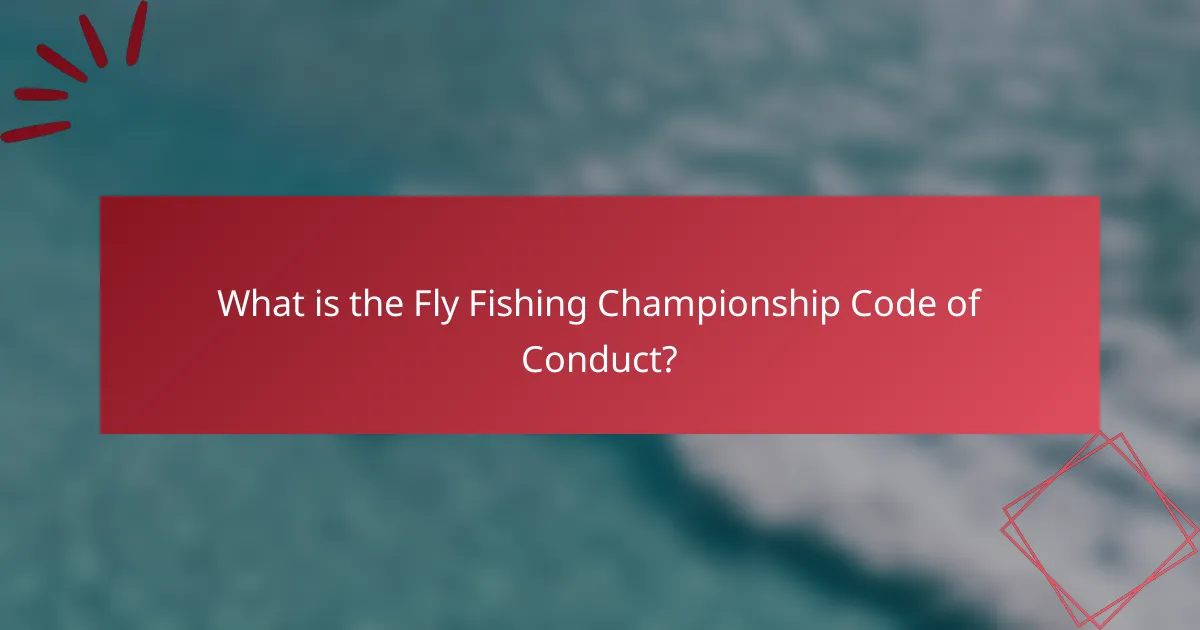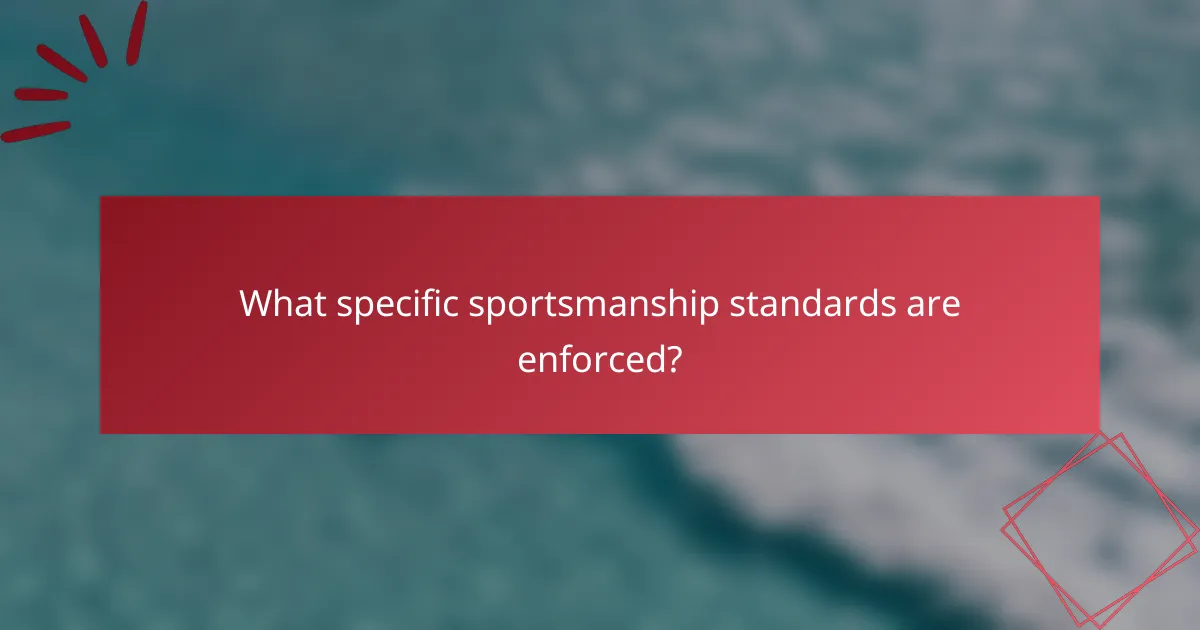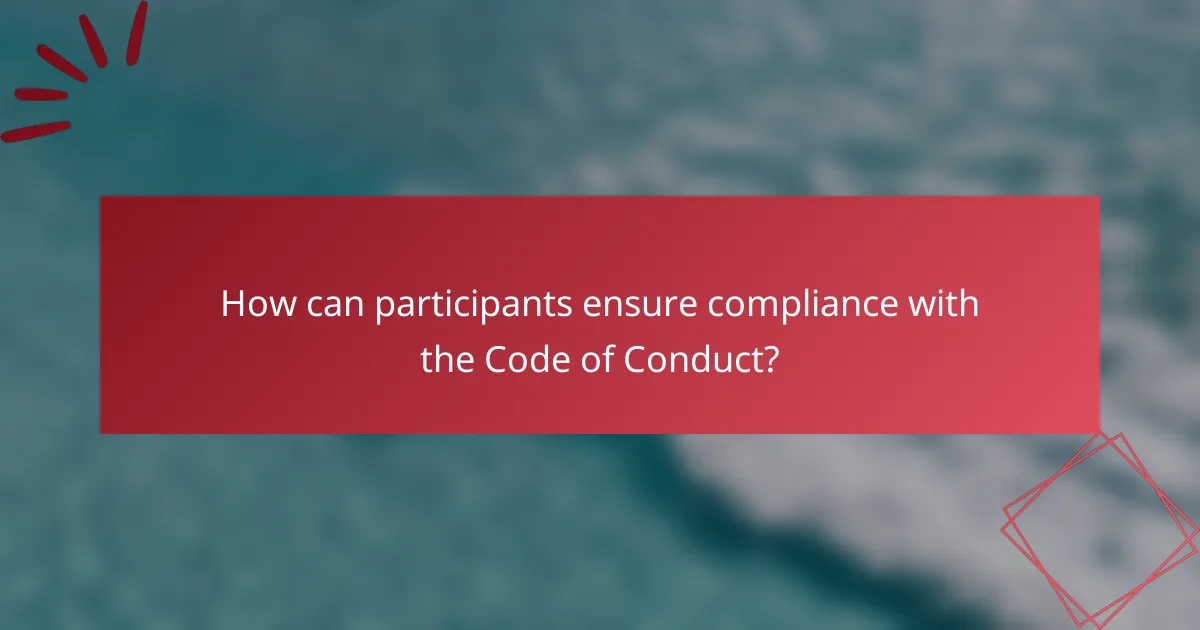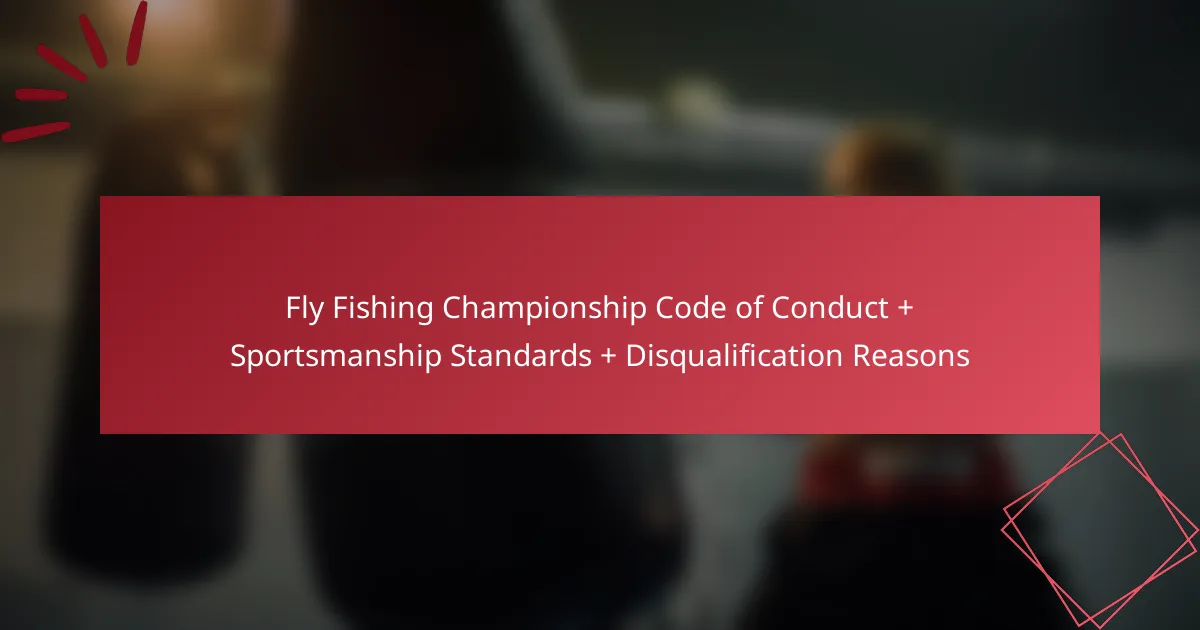The Fly Fishing Championship Code of Conduct establishes essential guidelines aimed at promoting fair play and sportsmanship among participants. This code emphasizes respect for fellow anglers, adherence to local fishing regulations, and ethical catch-and-release practices. Key standards include prohibitions against cheating, harassment, and unsportsmanlike behavior, with violations potentially resulting in disqualification. To ensure compliance, participants are encouraged to familiarize themselves with the code, attend pre-event briefings, and engage in open communication regarding any concerns. Overall, adherence to these standards fosters a positive environment and upholds the integrity of the sport.

What is the Fly Fishing Championship Code of Conduct?
The Fly Fishing Championship Code of Conduct is a set of guidelines designed to ensure fair play and sportsmanship among participants. It emphasizes respect for fellow anglers, the environment, and the fish. Participants must adhere to local fishing regulations and practice ethical catch-and-release methods. The code outlines prohibited behaviors such as cheating, harassment, and unsportsmanlike conduct. Violations can lead to disqualification from the championship. Adherence to the code fosters a positive atmosphere and promotes the integrity of the sport.
How does the Code of Conduct apply to participants?
The Code of Conduct applies to participants by establishing expected behaviors during the Fly Fishing Championship. It outlines standards for sportsmanship, emphasizing respect for fellow competitors and the environment. Participants must adhere to these guidelines to ensure fair play and integrity in the competition. Violation of the Code can lead to disqualification, reinforcing the importance of compliance. The Code serves to maintain a positive atmosphere and uphold the championship’s reputation. Adhering to these principles is essential for all participants.
What are the key principles outlined in the Code of Conduct?
The key principles outlined in the Code of Conduct include integrity, respect, and fairness. Integrity emphasizes honesty and ethical behavior in all actions. Respect promotes consideration for fellow competitors, officials, and the environment. Fairness ensures adherence to rules and equitable treatment for all participants. These principles guide conduct during competitions and foster a positive sporting environment. Violations of these principles can lead to disqualification.
How does the Code promote fair competition?
The Code promotes fair competition by establishing clear rules and guidelines for participants. These rules ensure that all competitors have an equal opportunity to succeed. The Code outlines acceptable behaviors and practices during competitions. It emphasizes integrity, respect, and sportsmanship among participants. By defining disqualification reasons, the Code deters unethical practices. This fosters a level playing field where skill and strategy determine outcomes. Adherence to the Code enhances trust and camaraderie among competitors. Overall, the Code supports a fair and competitive environment in fly fishing championships.
Why is sportsmanship important in fly fishing championships?
Sportsmanship is crucial in fly fishing championships because it promotes fair play and respect among competitors. It ensures that all participants adhere to the rules and guidelines set forth by the organizing bodies. Good sportsmanship fosters a positive environment, encouraging camaraderie and mutual respect. This behavior helps maintain the integrity of the sport. Moreover, it enhances the overall experience for both competitors and spectators. According to the International Game Fish Association, sportsmanship is a core principle that underpins competitive fishing events. Violations of sportsmanship can lead to disqualification, emphasizing its importance in maintaining standards.
What behaviors exemplify good sportsmanship in fly fishing?
Good sportsmanship in fly fishing includes respecting fellow anglers, practicing catch and release, and following local regulations. Respecting fellow anglers means maintaining a courteous demeanor and avoiding interference with their fishing. Practicing catch and release helps conserve fish populations and ensures sustainable fishing practices. Following local regulations demonstrates adherence to the law and respect for the fishing environment. Additionally, sharing knowledge and techniques with others fosters a sense of community among anglers. Good sportsmanship also involves cleaning up after oneself to protect the natural habitat. These behaviors contribute to a positive fishing experience for everyone involved.
How can participants demonstrate respect towards fellow competitors?
Participants can demonstrate respect towards fellow competitors by adhering to the principles of fair play and sportsmanship. They should avoid unsportsmanlike conduct, such as taunting or belittling others. Acknowledging the skill and effort of competitors fosters a positive environment. Participants should also follow the rules and guidelines of the championship, ensuring fairness in competition. Communicating openly and courteously with others shows mutual respect. Additionally, helping fellow competitors in need, such as offering assistance with gear, exemplifies camaraderie. These actions contribute to a respectful atmosphere essential for a successful championship.
What are the consequences of violating the Code of Conduct?
Violating the Code of Conduct in the Fly Fishing Championship can lead to disqualification. Disqualification results in the participant being removed from the competition. It may also involve forfeiture of any prizes or awards. Violations can include unsportsmanlike behavior or cheating. Such actions undermine the integrity of the event. The governing body enforces these rules to maintain fair play. Consequences are clearly outlined in the championship guidelines. Adherence to the Code is essential for all participants.
What actions may lead to disqualification in fly fishing championships?
Actions that may lead to disqualification in fly fishing championships include violating tournament rules, using illegal gear, and fishing outside designated areas. Competitors must adhere strictly to the guidelines set by the championship organizers. Failure to comply with these rules can result in immediate disqualification. For instance, using bait instead of flies is typically prohibited. Additionally, any form of cheating, such as altering fish weights, is grounds for disqualification. Engaging in unsportsmanlike conduct, like verbal abuse towards officials or other competitors, also leads to disqualification. Each championship has specific regulations that competitors must follow to ensure fair play. Violating these regulations undermines the integrity of the competition.
How are disqualification decisions communicated to participants?
Disqualification decisions are communicated to participants through official notifications. These notifications typically occur via email or in-person announcements. The communication includes the reason for disqualification. Participants receive details about the specific rule violations. This process ensures transparency and fairness. It allows participants to understand the grounds for their disqualification. Additionally, the governing body may provide an opportunity for appeal. This approach upholds the integrity of the competition.

What specific sportsmanship standards are enforced?
Specific sportsmanship standards enforced in fly fishing championships include respect for competitors, officials, and the environment. Participants must adhere to ethical fishing practices. They are required to follow all tournament rules and regulations. Fair play is emphasized, with no cheating or unsportsmanlike conduct tolerated. Communication among anglers should be courteous and supportive. Violations of these standards may lead to disqualification. These standards ensure a positive experience for all involved.
How are sportsmanship standards evaluated during competitions?
Sportsmanship standards are evaluated during competitions through a combination of observation, scoring criteria, and referee assessments. Officials monitor participant behavior for fairness, respect, and integrity. Scoring criteria often include points for demonstrating good sportsmanship. Referees may issue warnings or penalties for unsportsmanlike conduct. Documentation of incidents is crucial for transparency. Historical data shows that consistent evaluations improve overall conduct in competitions. Research indicates that clear guidelines enhance participant understanding of expectations.
What role do judges play in assessing sportsmanship?
Judges play a crucial role in assessing sportsmanship during competitions. They evaluate participants’ behavior in accordance with established sportsmanship standards. Judges observe interactions among competitors and their adherence to the code of conduct. They assess actions that reflect respect, fairness, and integrity. Judges use their discretion to determine if a competitor’s behavior is unsportsmanlike. Instances of cheating or disrespect can lead to disqualification. Their decisions are based on clear guidelines set forth in the championship rules. This ensures a fair and respectful competitive environment for all participants.
How can participants appeal sportsmanship evaluations?
Participants can appeal sportsmanship evaluations by submitting a formal written request to the event organizers. This request should include specific details regarding the evaluation being contested. Participants must provide evidence supporting their claim, such as witness statements or video footage. The appeal must be submitted within a designated timeframe, typically outlined in the championship rules. Event organizers will review the appeal and may hold a hearing to discuss the case. Participants will receive a written decision regarding the outcome of their appeal. This process ensures transparency and fairness in addressing concerns about sportsmanship evaluations.
What are common disqualification reasons in fly fishing championships?
Common disqualification reasons in fly fishing championships include violations of competition rules. These violations may involve using prohibited equipment or bait. Anglers may be disqualified for fishing in restricted areas. Failure to adhere to catch and release guidelines can also lead to disqualification. Additionally, unsportsmanlike conduct during the competition is a frequent reason. Not reporting a catch accurately may result in penalties as well. Lastly, lack of proper identification or registration can lead to disqualification. Each of these reasons is outlined in the championship’s code of conduct.
What violations are most frequently cited for disqualification?
The most frequently cited violations for disqualification in fly fishing championships include cheating, such as falsifying catch records. Additionally, anglers may be disqualified for not adhering to designated fishing boundaries. Failure to comply with equipment regulations is another common reason for disqualification. Poor sportsmanship, including unsportsmanlike conduct toward other competitors, can also lead to disqualification. These violations undermine the integrity of the competition and are strictly enforced.
How does cheating impact the integrity of fly fishing competitions?
Cheating severely undermines the integrity of fly fishing competitions. It creates an uneven playing field, disadvantaging honest competitors. This behavior erodes trust among participants and organizers. Cheating can lead to disqualifications, as outlined in the competition’s code of conduct. For instance, the International Game Fish Association emphasizes fair play and adherence to rules. Violations can result in penalties or bans from future events. Maintaining integrity is crucial for the sport’s reputation and longevity. The presence of cheating can deter new participants from entering the sport. Ultimately, it damages the community’s spirit and shared values.

How can participants ensure compliance with the Code of Conduct?
Participants can ensure compliance with the Code of Conduct by thoroughly understanding its guidelines. They should review the Code of Conduct document before the event. Attending pre-event briefings can clarify expectations and responsibilities. Participants must adhere to the principles of sportsmanship and respect for fellow competitors. Reporting any violations or concerns to officials is crucial for maintaining integrity. Regular self-assessment of behavior against the Code can help participants stay aligned with its standards. Engaging in open communication with peers fosters a culture of accountability. Familiarizing themselves with potential disqualification reasons can prevent inadvertent breaches. Compliance ultimately enhances the overall experience for everyone involved.
What best practices should participants follow to uphold standards?
Participants should adhere to guidelines that promote integrity and respect in fly fishing competitions. They must familiarize themselves with the championship rules. Understanding the specific regulations ensures compliance. Participants should practice ethical fishing methods. This includes respecting catch limits and avoiding harm to the environment. Communication with fellow competitors should be courteous and sportsmanlike. Acknowledging the efforts of others fosters a positive atmosphere. Participants should also report any violations they witness. This accountability helps maintain the integrity of the event. Following these best practices supports a fair and enjoyable competition for everyone involved.
How can participants prepare for ethical challenges during competitions?
Participants can prepare for ethical challenges during competitions by understanding the competition’s code of conduct. Familiarizing themselves with rules and regulations is essential. This knowledge helps in identifying potential ethical dilemmas. Engaging in discussions about ethics with peers can provide diverse perspectives. Practicing decision-making in hypothetical scenarios can enhance readiness. Participants should also reflect on personal values related to sportsmanship. Seeking mentorship from experienced competitors can offer valuable insights. Training in conflict resolution may also be beneficial. These strategies collectively equip participants to navigate ethical challenges effectively.
What resources are available for understanding the Code of Conduct?
The resources available for understanding the Code of Conduct include official documents, guidelines, and educational materials provided by the organizing body. The Fly Fishing Championship often publishes a detailed Code of Conduct on its official website. These documents outline expected behaviors and standards for participants. Additionally, workshops and seminars may be offered to educate competitors on the Code. Online forums and discussion groups can also provide insights from experienced participants. Lastly, rulebooks often contain sections dedicated to the Code of Conduct and sportsmanship standards.
What tips can help participants maintain good sportsmanship?
Participants can maintain good sportsmanship by showing respect towards opponents and officials. They should acknowledge the skills and efforts of others, regardless of the competition outcome. Open communication is vital; discussing concerns respectfully can prevent misunderstandings. Adhering to the rules demonstrates integrity and fairness in competition. Encouraging teammates fosters a positive environment and promotes camaraderie. Participants should remain calm and composed during competition, even in challenging situations. Applauding good performances from others reinforces a spirit of sportsmanship. Lastly, reflecting on personal behavior and its impact on the sport helps cultivate a culture of respect and fairness.
How can participants handle conflicts with other competitors gracefully?
Participants can handle conflicts with other competitors gracefully by maintaining open communication. Clear dialogue helps to express concerns and prevent misunderstandings. Participants should also practice active listening. This approach fosters respect and understanding between competitors. Remaining calm and composed is essential during disagreements. Emotional reactions can escalate conflicts unnecessarily. Participants should focus on the issue at hand rather than personal attacks. This helps to keep discussions constructive. Seeking mediation from officials can also be beneficial. Officials can provide impartial guidance to resolve conflicts effectively. Following these strategies aligns with sportsmanship standards in competitive environments.
What mindset should participants adopt for a positive competition experience?
Participants should adopt a growth mindset for a positive competition experience. This mindset encourages learning from each experience, regardless of the outcome. Emphasizing effort over results fosters resilience and adaptability. Participants should focus on personal improvement and skill enhancement. Acknowledging the achievements of others promotes camaraderie and sportsmanship. Maintaining a positive attitude helps in managing stress and anxiety during the competition. Research shows that a growth mindset can lead to better performance and satisfaction in competitive environments. Specifically, studies indicate that individuals who embrace challenges tend to achieve higher levels of success and enjoyment in their activities.
The Fly Fishing Championship Code of Conduct establishes guidelines to ensure fair play and sportsmanship among participants, emphasizing respect for fellow anglers, the environment, and fish. Key principles include integrity, respect, and fairness, which are crucial for maintaining a positive atmosphere and the sport’s integrity. The Code outlines prohibited behaviors that can lead to disqualification, such as cheating and unsportsmanlike conduct, and provides a framework for evaluating sportsmanship during competitions. Participants are encouraged to adhere to these standards to promote a fair and enjoyable competitive experience.
